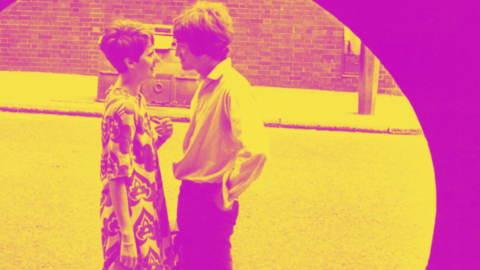Decades ago, ecstasy — yes, MDMA — was used in marriage counseling

Photo credit: Stephan C Archetti / Keystone Features / Hulton Archive / Getty Images
- For the first decade after it was synthesized, MDMA was used in individual and couples therapy.
- Many therapists spoke against the criminalization of MDMA in 1985 due to the drug’s therapeutic potential.
- A revival has occurred in recent years, with the government allowing clinical trials to move forward.
Before the second “M” was affixed to “MDA,” researchers spent decades searching for a utility for the mescaline derivative. Patented as “methylsafrylamin” in 1914 by Merck, the drug was shelved because no one could quite figure out what to do with it — similar to the incredible story of LSD.
That was until California pharmacologist Gordon A. Alles realized that MDA was rather interesting, indeed. He partnered with Chilean psychiatrist Claudio Naranjo to test out this “psychotherapeutic” substance. Naranjo’s partner, Alexander Shulgin, synthesized the more commonly known MDMA, which proved to be less hallucinogenic and less toxic than its original formation.
An early enthusiast was psychotherapist Leo Zeff, who began using psychedelics such as LSD in his practice in 1961. A few years later he discovered MDA through an associate of Shulgin. In 1977, Shulgin introduced Zeff to his new synthesis, which the therapist immediately took to. He trained more than 150 therapists in its usage over the next 12 years, administering it to over 4,000 clients.
This changed in 1985 when the U.S. government labelled MDMA a Schedule 1 drug, claiming it has no therapeutic utility. Many therapists offered testimony to the contrary, to no avail. Zeff, along with many others, went underground. This wasn’t the government’s first foray into an MDA derivative: in the 1950s the U.S. Army declared it to have no military use since the only feeling it seemed to invoke was compassion. In a country that spends more on defense than any other nation in history, this simply would not do.
As with many other victims of the “war on drugs,” both Nixon’s and Reagan’s, MDMA got itself in trouble by becoming popular outside of therapy, namely on dance floors. Teenagers enjoying themselves dancing to club music was apparently a social burden. Granted, as with virtually every substance, MDMA has a toxicity level that must be recognized; not every club night ended happily. To declare it useless, however, points more to the mindset of the administration than the therapist’s couch.
Rick Doblin On Using MDMA In Couples Therapy
Especially when that couch is a bed. While MDMA is now being shown to help alleviate PTSD, and many therapists used it in individual counseling in the 1970s and ’80s, couples received immense benefits from ingesting this “love drug” in its early days. Rick Ingrasci, who used LSD in therapy until it was banned, turned to MDMA next. Between 1980–85, he treated 100 patients in over 150 sessions; a third of his sessions were with couples.
To be clear, MDMA is not a “sexual” drug. When Ann Shulgin, Alexander’s therapist wife, administered it to patients, she made them consent to the “four agreements,” one of which was “no sexual activity.” Confusing boundaries could easily be breached when one is in such an open, transparent state.
That does not mean there is no sensual element. Sensuality in this context requires a redefinition, such as the way your favorite food enlivens your senses and a song embeds itself deeply into your consciousness. A strong bonding element is possible with MDMA, which applies to one’s mindset as easily as relationship challenges faced by couples.
Professionals have always realized this. While Friederike Meckel Fisher was imprisoned for using psychedelics, including MDMA and LSD, in her therapy practice after a spurned client retaliated, she now advocates for their usage in couples therapy. MDMA alleviates fear, she says, which allows individuals to access parts of their minds they might normally suppress. When you feel safe being vulnerable with your partner the potential for healing and growth becomes possible.
MDMA’s impact on romantic relationships – Katie Anderson
Others are stepping forward despite the law. Katie Anderson, in the Psychology Department at London South Bank University, recruited participants in a 2016 study called “MDMA: The Love Drug.” She coined the term, “MDMA bubble,” to describe the “protective casing” a couple enters as the substance takes hold. The sense of connectivity it offers serves as a powerful mechanism for dealing with past traumas and moving forward with confidence and clarity.
While the legislative focus has been on the dangers of drugs, deaths related to MDMA (and psychedelics generally) often occur in unstructured environments with unreliable doses and quality. In a clinical setting this is rarely the case. MDMA has been observed to “increase heart rate, blood pressure, and body temperatures,” though for healthy individuals this is not a big problem, especially when the benefits include emotional clarity, navigating intimacy, bonding, self-awareness, authenticity, expanded sensitivity, and the ability to discuss sexual fantasies in a safe environment.
MDMA could prove to be a powerful antidote to the loss of the “romance period” of new relationships as it expresses the same chemistry: dopamine, norepinephrine, and serotonin. Considering the DEA gave the thumbs up to clinical testing of MDMA for PTSD in 2015, there is no reason for it to remain a Schedule 1 substance. There is therapeutic utility, as the above and other research shows.
Simply put, we need it. While millennials waiting longer to get married has caused a plummet in the divorce rate, American couples still split roughly half of the time. MDMA is no silver bullet, but ever since it was synthesized many have found success using it. The fact that the DEA is loosening its grip is a step in the right direction. For individuals and couples, more steps are needed.
—
Stay in touch with Derek on Twitter and Facebook.





